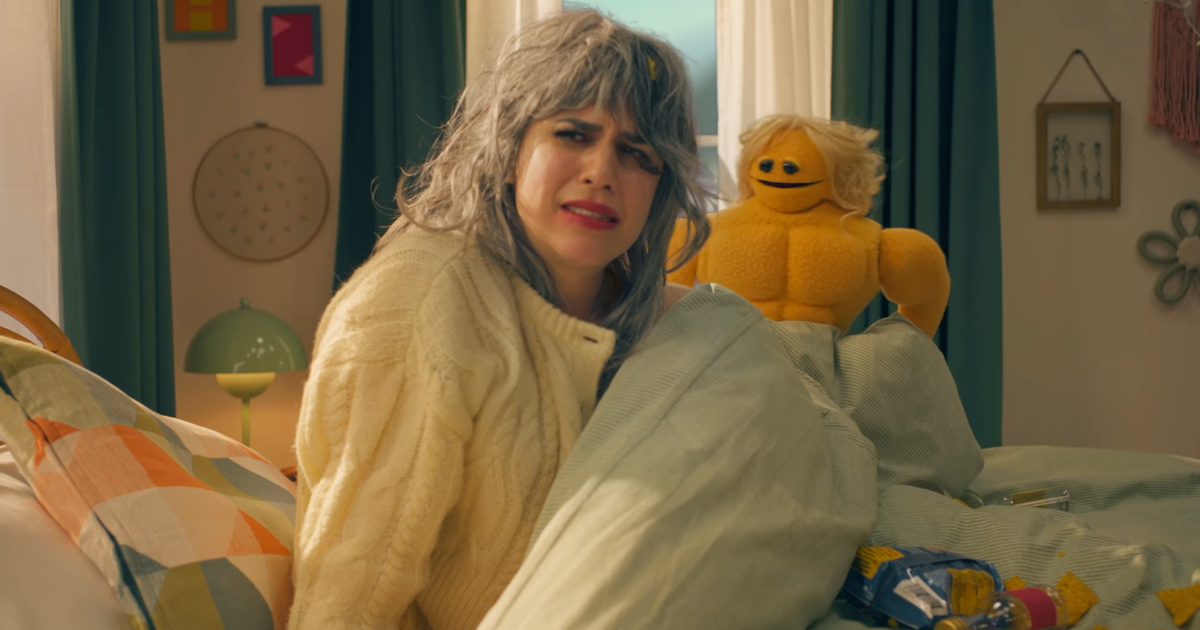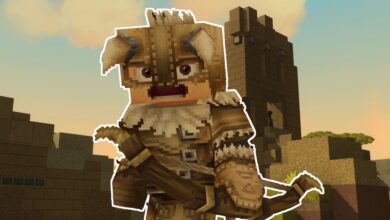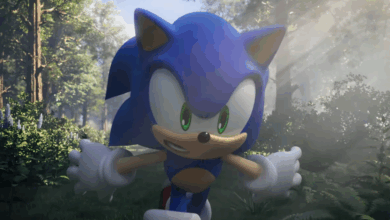Ashly Burch gets into bed with puppets to talk about mental health

I am sitting at my desk, listening to Ashly Burch. She highlights Kind Words – which is about anonymously writing and receiving letters, while also offering words of encouragement to those who need it – as a game which can benefit someone’s mental wellbeing in this, as she calls it, often complicated day and age. She’s right, I think to myself.
Burch is known to many for her video game roles: Aloy from Guerrilla’s Horizon series, Chloe Price in Life is Strange, Borderlands’ Tiny Tina, The Last of Us Part 2’s Mel. The list goes on. Then on top of all that, away from these video game-centric roles, she has also shared the screen with Rob McElhenney in Mythic Quest, while often appearing on table top web series Critical Role, and I am really only naming a small handful of her other credits.
She has now added yet another credit to her name, as creator of YouTube series I’m Happy You’re Here, which she describes as “like Mister Rogers’ Neighborhood, but for adults” (so, yes, there are swears). Burch’s latest project is all about the many mental health hurdles adults face today: addiction, anxiety, depression, divorce and more. However in true Burch style, these topics are all explored with plenty of comedic flare, complete with a bonus cast of puppets.
Mental health is an incredibly important topic for Burch, who tells me that, “just like any good millennial,” (although these sorts of things are, of course, not exclusive to millennials) she has plenty of her own inner demons to face as well.
“I was diagnosed with an anxiety disorder and I had pretty bad OCD [Obsessive Compulsive Disorder] when I was young, and I feel like our ability to talk to kids about mental health has gotten better, but also think that adults still need a lot of help,” Burch tells me over Zoom.
“I know people who are getting diagnosed with ADHD [Attention Deficit Hyperactivity Disorder] in their 40s, and so I think there is this misconception societally that we hit 30 and get pushed out of the proverbial nest. It’s like ‘just deal with it, you’re an adult, figure it all out’. And I don’t think any of us have figured any of it out – we need as much help, if not more.”
As Burch says, this funny thing we call life can get rather complicated as we get older. The goal of her show is therefore to offer a place of support for those who want some guidance on how to navigate life’s often more complicated issues. She hopes that I’m Happy You’re Here will start conversations, while also educating loved ones who maybe haven’t experienced a mental health condition for themselves.
While this show is her current focus, video games have still played a key part in bringing it from an idea to a puppet-filled reality, and Burch met many of the people working on I’m Happy You’re Here through her video game roles. Brina Palencia, known to many as Borderlands’ Mad Moxxi, takes on the show’s executive production and music duties. But, even way back before the idea for I’m Happy You’re Here took seed, mental health and video games went hand-in-hand for Burch. Since she was a child she’s used games to help her regulate her own anxiety.
“Like I said, when I was a kid I had really bad anxiety, and pretty bad OCD, and the only thing that helped me calm down was playing Harvest Moon 64,” she laughs. “It was truly the only thing that worked… I think my mum knew that something was going on, but there was no language to talk about it. So, I was kind of left to my own devices to try to manage an unregulated nervous system, and I found the only thing that calmed me down was the gentle repetitiveness of Harvest Moon.
“Games have been a big part of my way of regulating my mental health and difficult times. If I feel overwhelmed, I still find that playing a gentle game can help me regulate.”
Video games really can play a very meaningful part in our mental health journeys. “I think because games are so arresting and they take up all your senses in a way, they have the power to help regulate your nervous system,” Burch continues. “But also, with games like Kind Words, they can be powerful ways of addressing mental health issues.”
_MsoWnzt.png?width=690&quality=70&format=jpg&auto=webp)
Aside from helping regulate her nervous system, video games also played a large part in shaping Burch’s career. “Ever since I was 12, I wanted to be a games actor,” she smiles. “I played Metal Gear Solid, and that was the first game that I realised – because it says Solid Snake played by David Hayter – and I was then like, ‘who is David Hayter?’ So, I looked it up and I was like ‘oh my god, that’s the voice actor for the character!'”
In that moment, the trajectory of Burch’s entire life changed. “I was like, ‘that’s what I want to do!’ I love games, so that’s what I want to do. And, I’ve been really lucky that I have been able to do that,” she says. “I’ve been able to play a lot of really amazing characters, and be in a lot of really amazing games.”
She recalls an old home video of her walking around with an unplugged NES controller in her hands, joking with me that she looked like the security blanket toting Linus from the Peanuts comic strips. Yes, this deep affection for video games really has been there since she “popped out,” Burch laughs.
Since those early days of cradling a NES controller, Burch has gone on to play a number of queer roles and identifies as queer herself. So along with being vocal about mental health and why it matters, representation within video games is also an incredibly important issue for her.
“I think Mass Effect was the first game that I played where you could have a gay relationship. If you chose to play as female Commander Shepherd, you could romance Liara,” she recalls, adding: “This is the thing about games. I think because you are controlling a character and influencing events, it has the most power to be a very meaningful mirror for the people who play the games.”
Burch tells me she has spoken to those who discovered they were trans after playing Tomb Raider and getting to control Lara Croft. “Seeing their movements being performed through a female body helped them understand ‘oh, this is actually what I want for me’,” she says.
“I think that is the same thing for queer representation, which is either to feel seen or as a discovery mechanism for people. They can feel ‘this is a safe way to explore this part of me’, without judgement. If you have a suspicion of what your sexuality may be, you can play pretend for a little bit and go into a game of some kind where that is part of the narrative and explore what that feels like, or have your identity you already know affirmed.”
Burch reflects on one of her first major roles as Chloe Price in Life is Strange, a game that years later still sparks debate and conversation (did you save bae or bay?!). “I think that game hit people in the way that it did because no one was used to seeing a game about, you know, a murder mystery and time manipulation, but really it was about two teenage girls figuring themselves out,” she says.
“I think it had such a massive impact on the industry because no one had seen a game like that… I think that was really surprising to people. That someone would make a game about the lives of teenage girls, and that it would be so impactful.
“I really like when games can stretch beyond what we are used to seeing from them and expecting from them. I hope they continue to do that.”


So given all this and given her new show, what does Burch want people who may be exploring their identity or seeking to take more control of their mental wellbeing to know in the here and now?
“I think when we are in a dark place, it is easy to feel like you are the only person in the world that feels that way, either in that moment or ever. Brains can do a good job tricking us into believing that we are the only people in the world that are suffering in the way that we are suffering – and, it is not true,” she replies. “Almost certainly, whatever experience you have, someone else has had it, and they have found a way through it. So, by extrapolation, that means you can also find your way through it.”
Burch says knowing there is an outside and knowing that we are not alone (even though it may sometimes feel like it) is a key part of her own mental health journey.
“Having dark nights of the soul, which I have had, and the pain of the experience of feeling like you are alone with something is probably one of the most difficult experiences a person can have,” she says. “And so, even if it is really hard and scary – and this is part of the purpose of I’m Happy You’re Here – this is a show you can turn on and see yourself and your experience reflected, and not feel so alone.”
Burch again looks back on her own experiences growing up, saying when she first started having OCD symptoms as a child, she didn’t understand what was happening. “And then, I found a forum online of people talking about the intrusive thoughts that they have, and I discovered that was a symptom of OCD. I didn’t realise that was a symptom of OCD, I just thought I was actually insane. Like, I truly thought that I was going bonkers,” she says.
This realisation and assurance that she was not alone took a welcome weight off her shoulders, offering relief that she too could be okay. “It’s hard sometimes when you are in a difficult place to have any positive or soothing thoughts enter, [but] know that you are not the first person who has had this experience and you will not be the last. Know there is a pathway, and people have walked it before,” she says.
“It is about finding the people who have walked it, and getting that help, be that finding a therapist or joining a group or even just watching videos and TikToks online of people talking about their experiences. It is really important to teach our nervous systems that we are not alone with the feeling we are having,” Burch closes.
“And as Mister Rogers used to say: If it’s mentionable, it’s manageable.”
The first episode of I’m Happy You’re Here is currently available to watch on YouTube.
If you need someone to talk to, the Samaritans are there to help. They can be called, for free, on 116 123 in the UK and Ireland, or emailed on [email protected] / [email protected]. Lines are open 24 hours a day, 365 days a year.
Other international suicide helplines can be found at Befrienders Worldwide. You can also find more details on the Mental Health Foundation here. For Europe, more information on various helplines can be found via Mental Health Europe.



